The Thursday Crowd
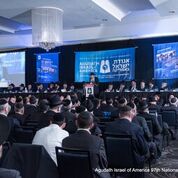
All weekday sessions are available for viewing or listening at https://agudahconvention.org.
There was tremendous energy in the air at the Agudah Convention, which took place over the weekend of Shabbos Parshas Toldos in the Crowne Plaza Stamford. The theme of this year's Convention was "Stories: Yours. Theirs. Ours." But to fully tell the story of the Convention; to list all the speakers and topics discussed; to describe the atmosphere at the beautiful Shabbos seudos; to even give justice to the topics discussed in the Yarchei Kallah shiurim, is all but impossible in the space allocated for this article.
This will give a summary of the main keynote sessions of the Convention, which took place Thursday night, motzei Shabbos, and Sunday, along with some of the concurrent sessions on Thursday.
As in past years, the Agudah Convention was completely sold out weeks before it began.
Thursday
"When recounting a story, with the advantage of hindsight and the ability to put all the pieces of the puzzle together, we are shocked to discover that those same random events, seemingly lucky breaks, Rachmono litzlan heartbreaking tragedies or failures, are clearly hashgacha protis, the actualization of the Ribono Shel Olam's master plan." These words, from the evening's chair, Ronnie Wilheim, helped set the tone of the evening: Our actions and what happens to us have import.
In the words of Rabbi Malkiel Kotler, Chaver Moetzes Gedolei HaTorah and Rosh Hayeshiva of Beis Medrash Govoha, "Our ma'asim are not stories - our ma'asim are yetzirah, our ma'asim are bringing the geulah to Klal Yisroel!"
Rav Bender
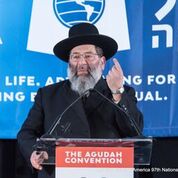
One way to have our ma'asim make a disproportionate impact, said Rabbi Yaakov Bender, Rosh Hayeshiva of Yeshiva Darchei Torah, is to reach out to someone near you: "Your next door neighbor needs somebody. There's an almanah down the block. There's people who don't have parnossoh. Knock on the door!"
What impact will you have? Maybe it will be very little, but like Rabbi Yoir Adler, Rav of Bais Medrash Shoavei Mayim, said, once you start doing something, your accomplishments might surprise yourself: "We have the raw materials, we have the potential, we have the abilities, to shake heaven and earth, to inspire the masses, to accomplish things way beyond what we can imagine."
An example of the very phenomenon described by Rabbi Adler was shown in a moving video detailing Eliana Cohen's story. Eliana was diagnosed with a rare genetic disorder when she was 18 months old. The treatment would cost 2.2 million dollars, and all that money would have to be raised in one week for the medicine to be given in the medically-approved time for administering it. Rabbi Moshe Matz, Executive Director of Agudath Israel of Florida, who was instrumental in the quixotic, but ultimately successful, campaign, introduced Rabbi Ariel Cohen, Eliana's father, to the convention's guests. Rabbi Cohen, for his part, took the opportunity to thank Klal Yisroel: "Thank you for being there for us, for making our story, your story."
Some stories were shared although not being on the Convention program. In an unscheduled address, Chairman of Agudah's Board of Trustees,ęShloime Werdiger, announced that Agudas Yisroel had also reserved the Barclays Center for the Siyum HaShas, to accommodate the huge demand for tickets. But it wasn't about the Siyum: "This is not the story of a great Siyum," he said, "this is the story of a great people. We, the am hanivchar, are bigger than a stadium and our aspirations cannot be contained in any one arena or coliseum."
Sessions
Children of aging parents must deal with many issues and fight the blase attitudes toward life's value prevalent today among many medical professionals. "Somebody has to be around all the time, 24/7," said Rabbi Yisroel Mantel, Morah De'asra, Khal Adas Yeshurun, on caring for ill parents, while in the same session, titled, "Aging Parents: Important Issues Parents and Children Must Know," Rabbi Shmuel Lefkowitz, President of Chayim Aruchim, and Rabbi Eliezer Gewirtzman, Member of Machon Chayim Aruchim, spoke to the need for a person to know his rights in hospitals and to own the strength of their religious beliefs. The session, chaired by Rabbi Gedaliah Weinberger, Chairman of the Board of Chayim Aruchim, and Rivie Schwebel, Vice Chairman of the Board of Chayim Aruchim, also addressed practical halachic considerations of avoiding family conflicts over inheritance issues, as detailed by Rabbi Ari Marburger, Director, Business Halacha Institute.
Other practical questions that concern many in our community due to the popularity of e-commerce is the need for guidance on how to deal with Shabbos concerns for one's business. In a Yarchei Kallah session titled, "Business Halacha: Operating Businesses on Shabbos and More," Rabbi Yosef Kushner, Dayan, Bais HaVaad of Lakewood, guided the attendees in how to set up their business in compliance with Hilchos Shabbos.
Addiction is a problem that too many in our community deal with, and in a panel discussion titled, "Lessons from Addiction: Real People. Real Stories. Real Impact," Menachem Poznanski, LCSW, Director of The Living Room, and Moshe Frankel, CASAC, Clinical Case Manager at Amudim, along with Rabbi Zvi Gluck, Director at Amudim, and a panel of people impacted by addiction, discussed the sometimes tragic stories of addiction and what can be learned from them.
It was there that another theme of the evening became apparent.
The Power of One
What happens when one person tries to create change? Should they even try? In this year's Leadership Lounge session, "Successfully Walking the Tightrope Between Life, Work and Family," moderator Elchanan Schwarz LMHC, Director of Crisis Intervention at BINAH, asked this question to the panelists. According to Howard Tzvi Friedman, Chairman of the Board, Beis Medrash Govoha, who presented along with Rabbi Zvi Soroka, Rebbe, Yeshiva Darchei Torah, and Rabbi Naftali Miller, National Director of Development, Agudath Israel of America, "It doesn't say anywhere that you have to be successful, just that you have to try."
This message was further enforced in a session titled, aptly, "The Power of One." Rabbi Zechariah Wallerstein, Menahel, Ohr Naava, began his presentation by noting how Torah Anytime, Agudah's partner in live streaming all the Convention's sessions, began with a single person who saw a need and worked towards filling it. There were one hundred people in the room, said Rabbi Wallerstein, but another thousand watching remotely at the same time! His co-presenter at the session, Rabbi Yossi Bensoussan CASAC, Mashgiach Ruchani, Yeshiva High School of Cleveland, spoke to the ripple effect of reaching out - whether it's kiruv kerovim or kiruv rechokim, showing a person that you really care, can make more of a difference in their life than you could have ever imagined.
Making Your Own Story
Over and over, the presenters stressed how important it is to reach out, to care for someone, to start writing a new chapter in your life: "You don't have to be a shadchan to make a Shidduch!" said Rabbi Adler.
Rav Brudny
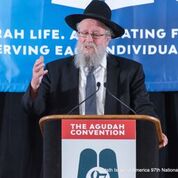
The latest session of the evening, ending after 11:30 p.m., was the Q & A session with Rabbi Elya Brudny, Chaver Moetzes Gedolei HaTorah and Rosh Yeshiva, Mirrer Yeshiva, and Rabbi Aaron Lopiansky, Rosh Yeshiva, Yeshiva of Greater Washington. The no-holds-barred session, titled, "I'm Asking for a Friend," was moderated by Rabbi Yisroel Besser, Editor of Mishpacha Magazine, who presented real problems that people had submitted for this panel.
What do we do about anti-Semitism? Rabbi Brudny noted that we need to remember that we're in Galus and act appropriately.
May one pretend to be "frummer" than one really is to get his or her children into a school with stricter policies? Besides for the issue of Geneivas Da'as that Rabbi Brudny noted, said Rabbi Lopiansky, don't send your children to a school that has different standards than you adhere to at home. "When you are playing a game with the school, that chinuch is worth nothing. Send your kid somewhere else."
Havdalah
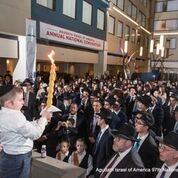
Motzei Shabbos
Motzei Shabbos's keynote session could, perhaps, be described as a "State of the Union" session for Klal Yisroel.
Rabbi Yaakov Perlow, Novominsker Rebbe and Rosh Agudas Yisroel, noted that Klal Yisroel's growth has been phenomenal over the past seventy years. "There are more bochurim and yungerleit learning in Lakewood today than in all the pre-war yeshivos of Lita put together." The Siyum HaShas, the greatest ma'amad of kovod haTorah in recent Jewish history, will be an impetus for further growth: In the words of Rabbi Elya Brudny, Rosh Yeshiva, Mirrer Yeshiva, and Chaver Moetzes Gedolei HaTorah: "Hundreds of thousands of us will be shteiging because of the Siyum HaShas."
But there is another side of the story.
Rabbi Yaakov Perlow, Novominsker Rebbe
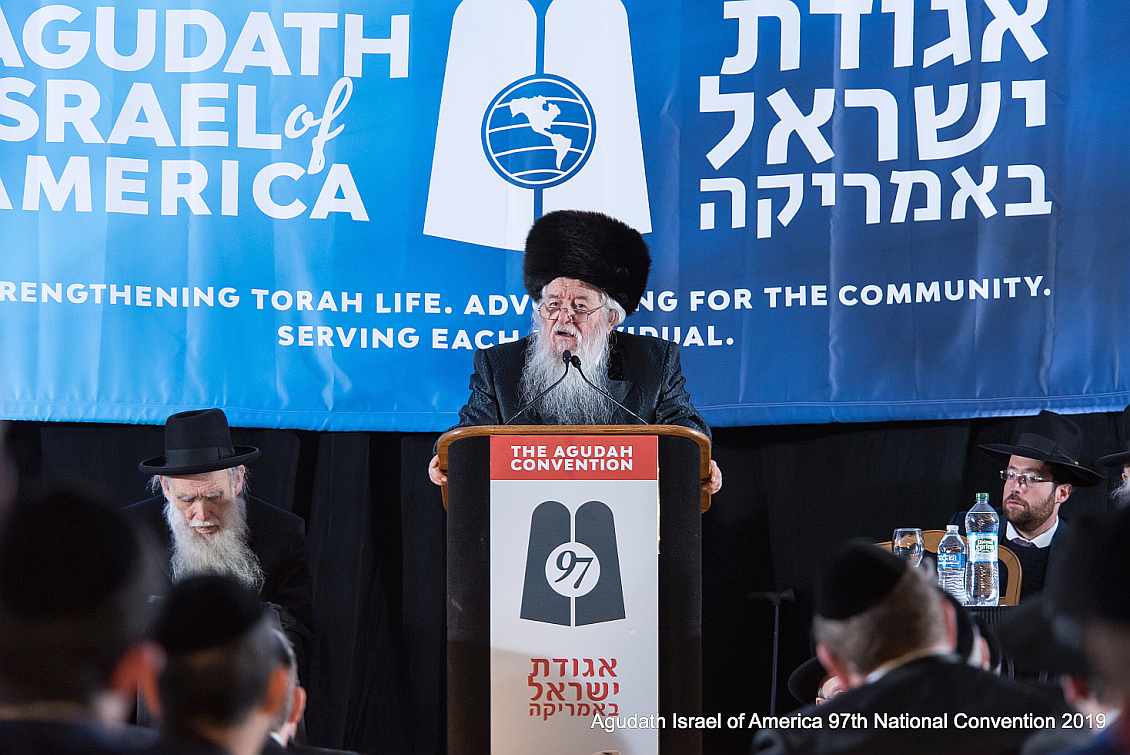
Rabbi Perlow bemoaned the growing Chillul Shabbos in Eretz Yisroel, and he reminded those present that the Moetzes Gedolei HaTorah recently proclaimed in a Kol Korei, that we, here in the United States, need to be mechazeik in shemiras Shabbos in response to this.
Rabbi Chaim Dovid Zwiebel, Executive Vice President, Agudath Israel of America, remarked on the anti-Semitism that is a danger to Klal Yisroel, and, even more so, the attacks on the very concept of religion itself.
In a further development in Eretz Yisroel that concerns us, as well, Chinuch Atzmai is suffering unprecedented financial hardship, as described by Rabbi Berel Povarsky, Rosh Yeshiva Ponovezh, Chaver Moetzes Gedolei HaTorah b'Eretz Yisroel. The potential consequence of this could be thousands of young children not being able to go to Yeshiva or Bais Yaakov.
Perhaps the perspective to help deal with all these challenges was best articulated by Mendel Tress, the evening's chairman and son of the Agudah hero R' Elimelech Gavriel "Mike" Tress: When it comes to Avodas Hashem, there is no room for any cheshbonos. "This was my father's life's mission, and this is what I believe he implanted in every fiber of Agudas Yisroel." Keeping this in mind will help us deal with what otherwise might seem insurmountable.
One way that the Agudah has learned to deal with the issues facing the Klal is through shtadlanus. The evening's audience watched a video highlighting some of the work of the regional offices of the Agudah in such areas as school choice funding and fighting anti-Semitic zoning laws.
There are, indeed, highs and lows. Rabbi Yechiel Spero, author of the Touched by a Story series, closed out the evening, and told a moving story of a mother, in the Holocaust, whose lesson to her young son was that notwithstanding all the bumps in the road, the road we're all on is the road to Yerushalayim.
Sunday
Sunday's keynote session addressed a problem that is becoming a rising concern: anti-Semitism. The session was moderated by Rabbi Labish Becker, Executive Director of Agudath Israel of America, who noted that anti-Semitism is a mystery. "The same thing that everyone does, and it's ok; if we do it, it's terrible."
Malcolm Hoenlein, Executive Vice Chairman of the Conference of Presidents of Major American Organizations spoke of the current state of the anti-Semitism, and the grave danger of the BDS movement. "Pittsburgh was the end of the age of innocence for American Jewry," he said. He called for everyone to call out and protest anti-Semitism, and to work towards eradicating it.
Sometimes people are apathetic - "What will my call do anyway?" Rabbi Avi Schnall, Director, Agudath Israel of America's New Jersey office, noted that voting and reaching out to public officials can work wonders towards showing them that their constituents are concerned about anti-Semitism. And, "We must report every incident of anti-Semitism, no matter how trivial!"
Rabbi Sholom Kamenetsky, Rosh Yeshiva, Talmudical Yeshiva of Philadelphia, closed out the Convention with a deep hashkafic look at anti-Semitism, based, in part, on the Netziv's She'eiris Echad. According to his explanation, anti-Semitism and hefkeirus go hand-in-hand; the Yid represents order in this world - Hashem commands us what to do, and we follow. But anyone who wishes to live a life of hefkeirus is reminded when he sees the Jew that this is wrong, causing hatred and anti-Semitism.
There are three responses to anti-Semitism, as modeled by Yaakov Avinu: doron, tefillah, and milchamah. While the "to do" items noted by the first speakers are certainly important, we must remember that milchamah is the last resort, after quiet shtadlanus and tefillah have not solved the problem.
Is That It?
The Convention is over, but the lessons of the Convention live on. All the (weekday) Convention sessions have been recorded, and can be accessed by going to www.agudahconvention.org/program, or via Torah Anytime.




